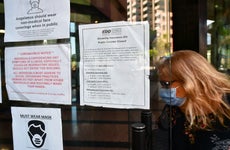Can you collect unemployment benefits if you have a side business?

The Bankrate promise
At Bankrate we strive to help you make smarter financial decisions. While we adhere to strict , this post may contain references to products from our partners. Here's an explanation for .
Whether you have a business along with your day job or you work for yourself full-time, your side hustle can be both an income boost and a drain on other resources.
Layoffs happen, whether resulting from restructuring, downsizing, or a business shutting down. When you are affected, it can be a cause of instability in your life — even if you have other work to help you get by — and you may want to make a claim on your unemployment insurance to cover the lost income. However, if you have a side business or are self-employed, your unemployment benefits might not be as high as those who aren’t working at all.
How do unemployment benefits work?
Unemployment benefits are a form of unemployment insurance meant to provide temporary financial assistance when you lose your job. This safety net is a joint program operated by states and the federal government and is designed to provide out-of-work Americans with cash.
“Unemployment insurance is just that—insurance to protect you when you’ve lost your employment income through no fault of your own,” says George Warner, program director and staff attorney for the non-profit legal services provider Legal Aid at Work, which focuses on workers rights.
Each state establishes its own specific criteria for benefits eligibility but generally, these criteria include:
- Having become unemployed through no fault of your own.
- Meeting work history and wage requirements, which generally involve state criteria pertaining to the amount of time you worked prior to losing employment and the wages earned during that time.
Your state may also have different requirements. You can research local requirements using the Careeronestop website, which is sponsored by the Department of Labor.
Can you collect unemployment if you have a side business?
Under traditional unemployment insurance programs, the answer to whether you are able to collect unemployment benefits while operating a side business varies case by case.
“It depends on a person’s specific circumstances,” says Warner. “You may be able to collect unemployment insurance even if you have a side business or part-time job. The maximum amount you can earn each week from a side business and still be eligible for benefits depends on your prior earnings and state law.”
Some states, for instance, reduce the amount of unemployment benefits you are eligible to collect, says Warner. Exactly how much depends on the exact laws where you live but could be as much as a dollar-for-dollar reduction based on your side hustle income. There are states, however, that allow you to earn up to a certain percentage of your total weekly unemployment benefits from a side business or part-time job without it impacting or reducing the benefits you are paid.
However, if you earn too much from a side business, it could make you ineligible for unemployment benefits altogether.
You’ll also want to be sure to fully report your side hustle income, as failure to do so can be considered unemployment insurance fraud, the penalties for which range from having to pay benefits back with interest to criminal charges.
To find out more about local regulations visit your state’s unemployment insurance website.
How do you apply for unemployment benefits?
Anyone seeking unemployment benefits, including those with a side business, can generally do so in person, over the phone or online through the unemployment office in the state where you worked.
Although the application process varies by state, some basic steps to take include:
- Locate your state’s unemployment office. The U.S. Department of Labor provides a helpful unemployment benefits locator map.
- Prepare your personal information. You’ll need to have details like your address, phone number and Social Security number, as well as bank information if you’d like to receive your benefits through direct deposit.
- Gather your income information, including recent pay stubs. You might be asked for financial information, like your total income for the year. If your unemployment office requests additional documentation, you should have 1099s, your annual tax return or other proof of income on hand.
What should you do if you’re not eligible for unemployment benefits?
If you applied for unemployment benefits as a side business owner but your application was denied, you might still have options to help you stay afloat.
Consider appealing the decision
You have the right to file an appeal if you were denied unemployment benefits. Contact your state’s unemployment benefits website to formally submit an appeal. The exact requirements for the appeal might vary between states.
If your appeal is still denied, you might be able to file a second-level appeal in some states. For example, California workers can file a second-level appeal within 30 days of the date when the initial appeal was denied.
Communicate with your creditors
As you navigate a potential appeal, it’s helpful to find relief for immediate bills that come due while you await the appeal’s outcome.
Communicate regularly with your creditors to explain your current financial situation. Learn about repayment options the lender or creditor offers for individuals facing temporary financial hardship. Some lenders might offer short-term deferment or forbearance, allowing you time to look for another job before your payments begin again.
Similarly, some might be willing to negotiate a more manageable payment plan. For example, this approach can be useful for hospital bills or phone bills
Living on only your side business earnings can feel like a blow to your financial stability. However, some resources and strategies might be available to help you get through financially uncertain periods.
Other alternatives if you’re small business is struggling
If you’re working to ramp up a side hustle because of a layoff, or are otherwise relying on a small business income but are struggling, you aren’t entirely without options. You can work on your small business, seek out resources and aid, and potentially look for part-time or full-time work at the same time.
For instance, the federal Small Business Administration funds a variety of specific grant programs that could apply to your business. At the state and local level, the Chamber of Commerce may have benefits for you, from grant and loan opportunities to help your business weather a setback, to mentoring and discounted membership to increase your visibility to customers. You can find your local Chamber of Commerce here.
Much like you can let side business income help float you during a layoff, you can consider seeking part-time or full-time employment during a quiet period for your side business. If your side business work has dried up or has a quiet season, look at the temporary work that is available in your area to fill the gaps. Working these jobs keeps you out and about while bringing in needed income; you may learn something in the course of working a job that makes your next steps more clear for your small business.
Bottom line
Having a side business that provides additional income helps combat the instability that may come from losing a job or facing unemployment. However, having additional income available to you might also make it harder for you to access the unemployment benefits that would otherwise be available if your primary source of income were to disappear.
Look into your state’s rules for unemployment benefits claims to find out what you can access. Prepare all of your documentation about your loss of employment as well as your side businesses and income, and be prepared to present that information and file an appeal if necessary to get any unemployment benefits that are available to you.
Related Articles

Unemployment benefits: 8 possible reasons your payment is late — and what to do about it

Unemployment benefits and coronavirus: Here’s who qualifies and how to apply

